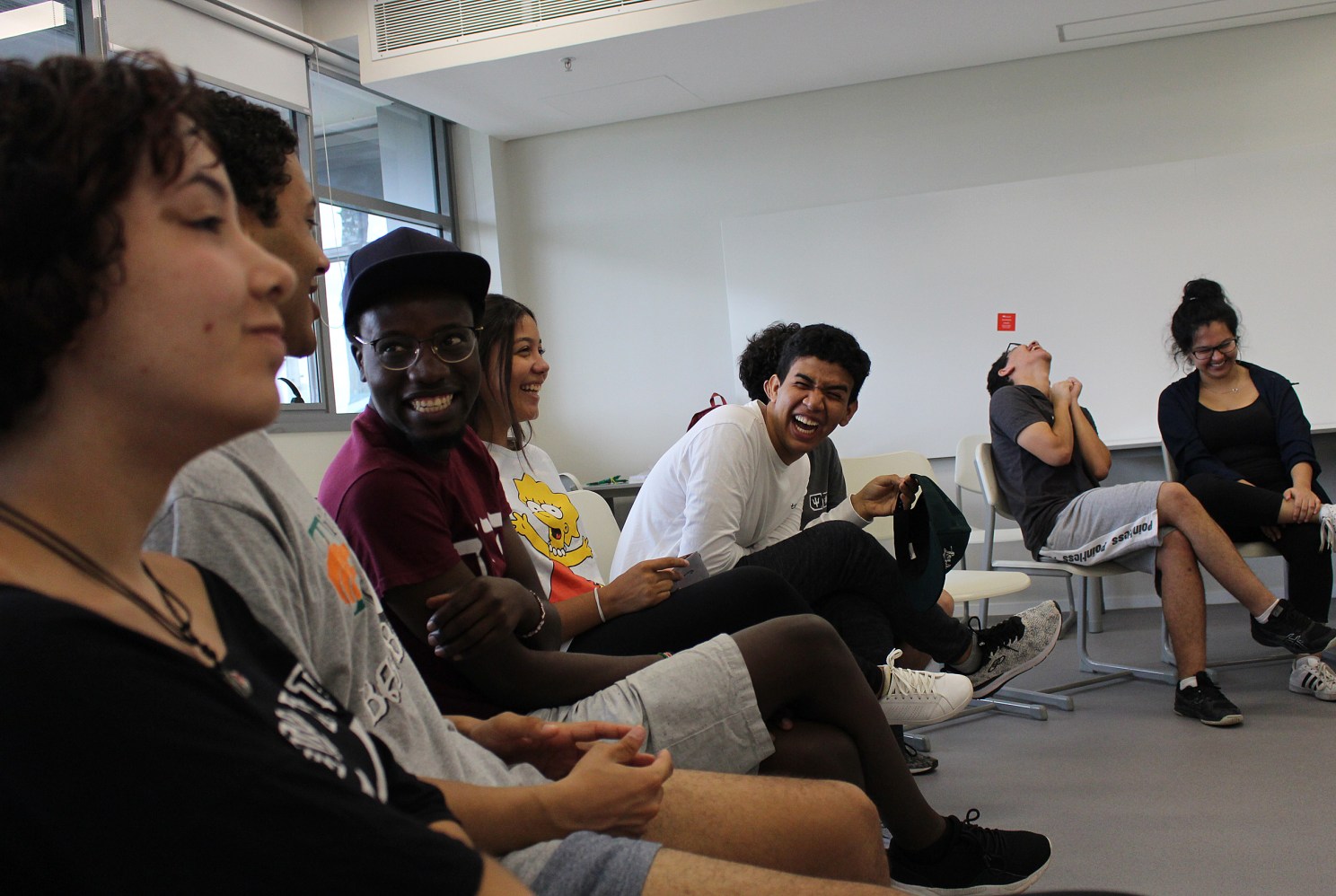Mentorship program uplifts Brazilian students

Camilo Vasconcelos (center) laughs with other program participants. Photos courtesy of DCRLAS
Camilo Vasconcelos, a freshman from Fortaleza, Brazil, had his first contact with Harvard while he was still in high school.
In 2017, Vasconcelos was accepted as a mentee in the Mentoring and Language Acquisition in Brazil (MLAB) program — organized by the David Rockefeller Center for Latin American Studies (DRCLAS) — and was matched with a Harvard College student who provided him with four months of one-to-one virtual mentoring. In a recent interview, Vasconcelos wrote: “I was expecting from MLAB much less than what I actually got: inspiration, friendship, networking, motivation, and cultural awareness.”
The most anticipated component of MLAB, however, are not the virtual sessions. MLAB also provides its mentors and mentees with the opportunity of engaging face to face over a two-week immersion in São Paulo, Brazil during winter break.
“Throughout the mentorship sessions and immersion, my mentor and the other mentors and mentees helped me to be a better version of myself,” Vasconcelos said. “I felt motivated to always do my best and look into opportunities that once seemed unreachable.”
Before MLAB, studying at Harvard seemed like one of those unreachable goals to Vasconcelos, but with the help of his mentor, Tessa Wood ’21, and support from Education U.S.A., he was accepted early action.
MLAB continues to be a big part of Vasconcelo’s Harvard experience. Within his first few weeks on campus, Vasconcelos was accepted as an MLAB mentor. Going from mentee to mentor, he has gained a fuller understanding of the program and reflected on his changing role within it.
“Being a mentor is definitely different. You have to be more assertive, surer of what you are doing, and more resourceful than ever in order to use your network to help your mentee,” he said. “Knowing you can impact someone else’s life and being able to transmit your knowledge to them is priceless and this is what makes the experience worth it.”
Jannely Villareal ’20 said she was excited to join MLAB due to prior experiences as both a mentor and mentee. “I am immensely grateful for the mentors who have substantially facilitated and enriched my life,” Villareal wrote. “From the perspective of a mentor, I genuinely appreciate how mentorship can change lives and encourage personal growth. It is unfortunate when bright, motivated youth push their dreams aside because their circumstances make those dreams seem difficult to obtain. In those moments of uncertainty and disillusionment, the positive energy and unconditional support from a mentor can make a world of difference.”
Vasconcelos and Villareal are two of 11 Harvard College students who spent two weeks in São Paulo, Brazil, this winter break mentoring high need, high potential Brazilian high school students through MLAB.
[gz_photo_layout_hanging_cap image=”296477″ caption=”Students%20with%20instructors%20after%20a%20capoeira%20workshop.” /]
For the mentees, this is a singular opportunity to develop their confidence, critical thinking, and English language skills in person with Harvard undergraduates.
For the mentors, the immersion allows them to deepen their connections with mentees while also exploring Brazilian culture and the Portuguese language through site visits, lectures, and other experiential activities.
Camilla Roberts, program coordinator at DRCLAS’ Brazil Office, who is managing MLAB for the first time, said, “Watching the mentors go out of the way to create the best experience for their mentees and witnessing both mentees and mentors step out of their shells and be open to explore their different languages and cultures has been especially beautiful and rewarding.”
This year, the MLAB cohort requested to focus immersion activities in São Paulo on education, inequality, and the environment. Thanks to the generosity of Brazilian academics, activists, Harvard alumni, and other guest speakers, program participants were able to deepen their understanding of these issues within the Brazilian context.
Together with visits to elite research institutions, startups, and public policy think tanks, students also had the unique opportunities of visiting some of São Paulo’s underprivileged peripheries to learn about local NGOs and community initiatives. In a visit to the eastern neighborhood of São Mateus, for example, students interacted with a collective of local rappers and graffiti artists who — besides creating an open air gallery of vibrant, politically charged graffiti — established a community space to offer free arts and education workshops to local youth.
Since 2012, MLAB has offered mentorships to over 100 high school students, most of whom have been accepted to Brazil’s top universities. Several former mentees have also been accepted to elite universities in the United States. Vasconcelos, the second former mentee to have been accepted to Harvard College, is but one example.
He cites his experience with MLAB as influential in choosing Harvard. “One of the reasons why I placed Harvard as my top school was because I liked the efforts of the university in impacting the education of Brazilian low-income high school students through programs like this one.”
For Villareal, MLAB has offered her an unparalleled opportunity to connect with someone from across the world. “From learning about Brazil’s colloquial slang and popular music to discussing political issues in the country, MLAB has provided me with a unique lens into the everyday lives of youth living there,” she wrote. Beyond that, Villareal sees the mentorship sessions as a chance to expand her own perspectives; “having the opportunity to chat with youthful students in the process of exploring all their options reminds me to be open-minded, maintain a curiosity for learning, and live in the now.”
— Tiago L M Genoveze




